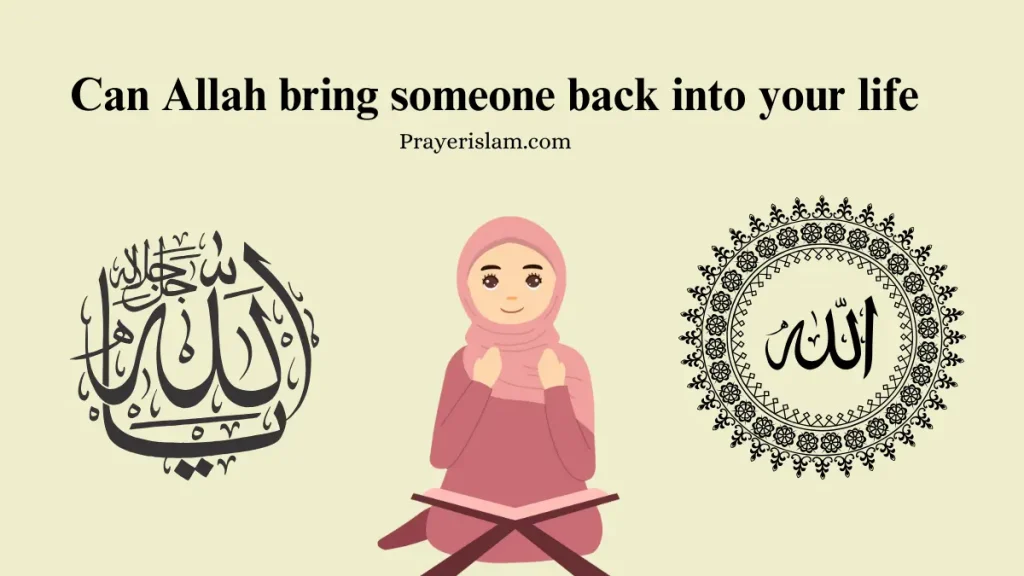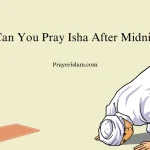In our lives, relationships often take unexpected turns. People come and go, leaving lasting impacts on our hearts and minds. But what if someone you deeply care about has left your life? Can Allah bring them back into your life? This question touches on the deep intersection of faith, destiny, and human emotions. In this blog post, we will explore this topic from an Islamic perspective, focusing on the concepts of divine will, prayer, and trust in Allah’s plan.
Can Allah bring someone back into your life?
Yes, of course Allah can bring someone back into your life if He wills. Because Allah subhanahu wa ta’ala has immense power. He knows everything about our past and future. So if Allah wants to bring someone back into your life then it is possible for Him.
However, Allah subhanahu ta’ala only accepts good decisions for people. That is why you can ask Allah for someone with your heart, if he has been good to you, He will give him back to you.
1. Understanding Allah’s Qadr (Destiny)
In Islam, belief in Qadr (destiny) is one of the six pillars of faith. Everything that happens in our lives is by the will and decree of Allah. This includes the people who come into our lives and those who leave. Understanding Qadr helps us accept that whatever happens, it is part of Allah’s divine plan, which is ultimately for our benefit, even if we don’t see it immediately.
2. The Power of Dua (Supplication)
Dua is a powerful tool for a believer. It is a direct means of communication with Allah, where one can express their desires, hopes, and needs. If you wish for someone to come back into your life, making sincere dua is encouraged. However, it’s important to remember that Allah’s response to our dua can manifest in different ways—He may grant it, delay it, or replace it with something better.
3. Trusting in Allah’s Wisdom
Sometimes, we might feel desperate for someone to return to our lives. However, it is essential to trust that Allah knows what is best for us. The one who created us knows what our hearts desire, and He also knows what is best for our spiritual and emotional well-being. Trusting in Allah’s wisdom means being patient and having faith that His plan is always better than our own.
4. Reflecting on the Reasons for Separation
When someone leaves your life, it can be helpful to reflect on the reasons behind the separation. Was it due to misunderstanding, personal growth, or perhaps a test from Allah? Understanding these reasons can offer insights into whether it’s beneficial for that person to return. Sometimes, separation is a means of growth and self-discovery that we wouldn’t have achieved otherwise.
5. The Role of Istikhara (Guidance Prayer)
When faced with a significant decision, such as whether to pursue the return of someone in your life, performing Istikhara is highly recommended. Istikhara is a prayer seeking Allah’s guidance in making decisions. Through this prayer, you seek clarity and divine assistance in making the right choice, trusting that whatever outcome occurs is what is best for you.
6. Patience and Perseverance
Patience (Sabr) is a virtue highly emphasized in Islam. When you are longing for someone to return, patience is crucial. Things may not happen immediately, but with perseverance and faith, you can find peace in whatever Allah has decreed for you. Allah promises that with every hardship comes ease (Qur’an 94:6), and being patient in difficult times brings immense rewards.
7. Accepting What Allah Has Decreed
Acceptance is a significant part of faith. If, after all efforts and prayers, someone does not return to your life, it is essential to accept that this is Allah’s decree. Acceptance does not mean giving up but rather embracing the reality with a positive outlook and moving forward with trust in Allah’s plan.
8. The Concept of Closure in Islam
In cases where someone does not return, seeking closure can be important for your emotional and spiritual well-being. Closure in Islam comes from understanding that everything happens for a reason, and Allah’s wisdom is beyond our comprehension. It involves making peace with the past, forgiving, and moving on while keeping a strong connection with Allah.
9. Moving Forward with Faith
Life is full of challenges, and moving forward after a significant person leaves your life can be difficult. However, Islam teaches us to continue living with faith and optimism. Remembering that every challenge is a test and that Allah does not burden a soul more than it can bear (Qur’an 2:286) can give you the strength to move forward with hope and resilience.
10. Finding Peace in the Remembrance of Allah
In moments of sorrow and longing, turning to the remembrance of Allah (Dhikr) can bring immense peace. The Qur’an says, “Verily, in the remembrance of Allah do hearts find rest” (Qur’an 13:28). Engaging in Dhikr, reciting the Qur’an, and staying connected to your faith can help you find tranquility, regardless of whether someone returns to your life or not.
Conclusion
The question of whether Allah can bring someone back into your life is deeply connected to understanding divine will, trusting Allah’s plan, and maintaining a strong relationship with Him through prayer and patience. While it is natural to desire the return of someone special, it is important to approach the situation with faith and acceptance, knowing that Allah’s wisdom is beyond our understanding. Whether or not that person returns, trusting in Allah’s plan will ultimately bring peace and contentment to your heart.
FAQs: Can Allah Bring Someone Back Into Your Life?
1. Can I make Dua for someone to come back into my life?
Yes, you can make Dua for someone to return to your life. In Islam, Dua is a powerful way to ask Allah for what you desire. However, it’s essential to make your Dua with the understanding that Allah knows what is best for you, and He may answer your Dua in ways you may not expect.
2. Does Istikhara help in making decisions about relationships?
Istikhara is highly recommended when making significant decisions, including matters of the heart. By performing Istikhara, you are seeking Allah’s guidance, asking Him to steer you towards what is best for you in this life and the hereafter.
3. What should I do if Allah doesn’t bring the person back into my life?
If the person does not return to your life, it’s important to accept Allah’s decree with patience and trust. Acceptance is part of faith, and understanding that Allah’s plan is always better for you can help you find peace and move forward.
4. How do I cope with the pain of losing someone I care about?
Coping with the loss of someone you care about can be challenging. In Islam, turning to Allah through prayer, Dhikr (remembrance of Allah), and reflecting on His wisdom can provide comfort. Seeking support from loved ones and focusing on personal growth can also help in the healing process.
5. Can someone be brought back into my life after many years?
Yes, it is possible, as nothing is beyond Allah’s power. However, whether it happens or not depends on Allah’s will and what is best for both individuals involved. If it’s written in your destiny, the person may return at the right time.
6. Is it wrong to keep hoping for someone to return?
It is not wrong to hope, as long as your hope is balanced with trust in Allah’s wisdom. It’s crucial to keep your faith strong, knowing that whatever happens is for your ultimate good, whether the person returns or not.
7. Can past relationships be rekindled in Islam?
Rekindling past relationships is possible if both parties are willing and if it aligns with Islamic principles. However, it’s important to ensure that any renewed relationship is built on Islamic values, mutual respect, and a commitment to fulfilling each other’s rights.
8. How do I know if it’s Allah’s will for someone to return to my life?
Determining Allah’s will can be challenging, but Istikhara, reflection, and patience are key. If things align smoothly and without forcing, it may be a sign of Allah’s will. Conversely, if obstacles persist, it may be a sign that it’s time to move on.
9. Can separation be a test from Allah?
Yes, separation can be a test from Allah to strengthen your faith, patience, and trust in Him. Tests are opportunities for spiritual growth and are a reminder to turn to Allah in times of hardship.
10. What does Islam say about letting go?
Islam teaches that letting go can be necessary when holding on becomes harmful to your well-being. Trusting in Allah, accepting His decree, and focusing on personal and spiritual growth are key aspects of letting go in a healthy and faithful manner.







